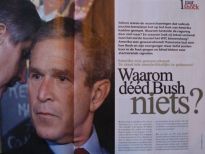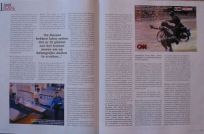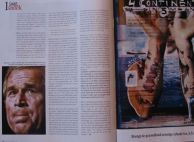
|
NEDERLANDS | ENGLISH
|
|
|
11 september 2002
|
 mail dit artikel
| mail dit artikel
|
 print
| print
|  
Why didn't Bush do anything?
This article has been published in the Dutch magazine Panorama, number 37 of September 4-11, 2002. Because of lack of space, the paper version of the article did not contain the text belonging to the headline Omens. In addition to this article, read the selected parts from The Enemy Within by Gore Vidal.
The Dutch in this article below has been translated by Marienella Meulensteen. By Daan de Wit Omens On September 11, 2001, the whole world watched with astonishment and abomination what resembled a movie, but was in fact reality: the U.S. was being attacked by terrorists who used airplanes as bombs. The question is now if indeed no one other than the perpetrators had advance knowledge. Let's start at the beginning.  White House Spokesperson Ari Fleischer and National Security Advisor Condoleezza Rice maintain that the idea of using airplanes as bombs never occurred to the members of the government. That's odd, because aside from the phenomenon of the kamikaze pilots in WWII, every secret service knows that in 1994 French police prevented a terror group from crashing an airplane into the Eiffel tower. And by 1993 a book had come out entitled Target America, which states that in Wakilabad, Iran an airfield with Boeings is available to hijackers who are training there. The author is not some obscure individual; his name is Yossef Bodansky. He is a member of all sorts of official advisory committees, and among other roles serves as the director of the Republican-sponsored Congressional Task Force on Terrorism and Unconventional Warfare. A few days after the attack in the U.S., his new book was published: Bin Laden, the man who declared war on America. White House Spokesperson Ari Fleischer and National Security Advisor Condoleezza Rice maintain that the idea of using airplanes as bombs never occurred to the members of the government. That's odd, because aside from the phenomenon of the kamikaze pilots in WWII, every secret service knows that in 1994 French police prevented a terror group from crashing an airplane into the Eiffel tower. And by 1993 a book had come out entitled Target America, which states that in Wakilabad, Iran an airfield with Boeings is available to hijackers who are training there. The author is not some obscure individual; his name is Yossef Bodansky. He is a member of all sorts of official advisory committees, and among other roles serves as the director of the Republican-sponsored Congressional Task Force on Terrorism and Unconventional Warfare. A few days after the attack in the U.S., his new book was published: Bin Laden, the man who declared war on America. The government may not have known anything, but a local FBI department knew a lot more. In what Time Magazine called The Bombshell Memo, FBI agent Colleen Rowley stationed in Minneapolis writes that she is fed up with her superiors in Washington who blocked her efforts during an investigation into Zacarias Moussaoui, someone who helped with the preparations for the hijackings. Special Agent Robert G. Wright, Jr. goes even further. He was also obstructed by his superiors, but says during a press conference that his investigation could have prevented the attacks on September 11th. A third FBI agent, John O'Neill, director of the National Security Department of the FBI, investigated Bin Laden. He quit because of discord, and also because of obstruction - in this case by the State Department. According to O'Neill, the obstruction had to do with the oil interests that Bush wanted to defend. [Retired Ambassador Richard Butler is familiar with the O'Neill case and confirms to CNN the importance of an oil pipeline that runs not through Russia, but through Afghanistan]. After his departure from the FBI, O'Neill began his new job a few days before September 11th, as head of security for the WTC. He was killed during the attack.
In the mid-1980's, Michael Springman was the head of the American visa office in the Saudi city of Jeddah. Contrary to the rules, he had to admit people who did not qualify for entry into the United States - so it appears from a story of BBC's Newsnight [download the report, read the transcript]. Later he found out that it concerned people who were picked out by Osama bin Laden, who were trained in the U.S., and who then left for Afghanistan to fight the Soviets. Springman [listen to interview] complained to the authorities, but realized that the illegal issuance of visas continued. He knows that the 15 Saudi pilots who took part in the attacks on September 11 received visas from the American Consulate and the CIA in Jeddah. An example of the ties between the CIA and its Pakistani colleagues at the ISI is their cooperation in supporting and training of Islamic groups that would have to fight the Russians in Afghanistan at that time. The U.S. provided three billion dollars for the ISI to spend. That was the way the Taliban would become large, so says South Asia expert Selig Harrison at a conference on terrorism, held before the attacks. Harrison: 'I warned them that they were creating a monster'. In April of 2001, Atta supposedly* had a meeting in Prague with Ahmad Khalil Ibrahim Samir Al-Ani, a secret agent from Iraq. That is what the Czech Minister of Interior Affairs, Stanislav Gross said in May of this year. Another meeting is just as interesting, namely the one between bin Laden and the CIA at the beginning of July 2001. Bin Laden was in Dubai for ten days to be treated for a kidney problem in an American hospital. The information about this meeting comes from the French intelligence services, which hopes that this revelation will serve to curtail American wishes to declare war on Iraq, so writes The Guardian. It was not only Bin Laden who knew where to find the Western intelligence services. Also Sayed Rahmatullah Hashimi, an advisor to the still fugitive Taliban leader Mullah Omar, had a meeting with the director of the CIA in March of 2001. This thanks to his PR person Leila Helms, who was the daughter of Richard Helms, former head of the CIA. The cordial ties between the Taliban and the U.S. had been established earlier, namely in 1997 (at that time, Bin Laden had become a regular guest of the Taliban). A group of representatives of the regime in Kabul was in Texas to discuss a deal with the oil company Unocal about a pipeline valued at $2 billion. The delegation was immersed in luxury. After the discussions they were invited to Washington to meet with representatives of the administration. In early 2001 the screws were tightened when an American diplomat informed the Taliban that they could choose between a carpet of gold or a carpet of bombs. At the beginning of this year Bush appointed an envoy to Afghanistan, Zalmay Khalilzad. He is a former employee of Unocal and in 1997 sent letters to the editor of the Washington Post with positive commentary on the Taliban. For that matter the interim president of Afghanistan, Hamid Karzai, also used to work for Unocal. In the know The Mossad feared an attack, and in early September Mossad chief Efraim Halevy sent a warning to the CIA. CIA director George Tenet found the warning to be 'too unspecific'. According to sources of the Mossad expert Gordon Thomas, the Mossad arranged for the Russians to warn the Americans on September 1st with the most explicit clarity of the looming danger. Also the FBI was informed. Efraim Halevy sent Washington a second warning on or about September 7th. The Frankfurter Allgemeine Zeitung reported shortly after the attacks on September 11th that the intelligence services of the U.S. and Israel had already received warnings three months before the attacks from the German secret service BND that terrorists planned to hijack airplanes and to have them crash into 'important symbols of American and Israeli culture'. This intelligence would have been obtained by making use of the world-wide surveillance network Echelon which eavesdrops on just about all telephone calls and emails in the world. Not only the Russians, the Israelis and the Germans warned the Americans. 'The Egyptian President Hosni Mubarak warned the U.S twelve days before the attacks of September 11th that 'something was going to happen', according to de Volkskrant of December 8th, 2001. Lesser gods also raised the alarm. A 29-year-old Iranian imprisoned in the German town of Langenhagen called the American police several times to warn them of an attack on the WTC. In spite of earlier warnings they didn't believe the man, and in Germany they think that he is mentally unstable. Others also said that the attacks were about to happen, but these stories were written off as being nonsense. One of those stories is about a boy who looks out the window at school, points at the WTC towers and says that by next week they won't be there any more. A reporter from MSNBC wanted to research the story, checked the information and came to the conclusion that it was true. It was a boy of Pakistani descent at New Utrecht High School in Bensonhurst, Brooklyn, New York, who had made that statement on September 6th. Mike Vreeland is connected with the intelligence division of the U.S. Navy. He was apprehended in Canada at the request of the U.S. (according to investigative reporter Mike Ruppert this case against Vreeland stinks to high heaven) and one month before September 11th he tried to smuggle a note out of his jail cell in Canada with details about the coming attack. Later while out on bail, Vreeland tells in an interview with Ruppert how he obtained his information. In December of 2000 during espionage activities in Russia, he examined a report of Saddam Hussein's son to the Russian Minister Vladimir Putin, in which he was briefed about the coming attack. At the advice of his attorney, Vreeland does not want to explain a certain sentence in his note: 'Let one of them happen. Stop the rest'. Vreeland does admit that from the sentence, and rightly so where he is concerned, it does appear that the American government was completely informed about the coming attack. He lets Ruppert read between the lines as he says cryptically: 'Sometimes certain governments design, create networks like al Qaida [...]. Those entities create specific problems at the creating government's direction'. The Russian newspaper Izvestia announces shortly after the attacks that the Russians swiftly informed the U.S. that 25 pilots were being trained to crash airplanes into important American targets. One month after the attack, military expert Alex Standish announces that in March of 2001, the Americans received an extensive report from the Russians with detailed information on Bin Laden. Standish, who has a copy thanks to a leak at the U.N., says that the U.S. had decided not to act for political reasons. Also in March, Secretary Powell transfers $43 million into the account of the Taliban with the kind regards of the Bush administration to aid in their fight against opium. A journalist for the L.A. Times talks about the 'Bush' Faustian deal with the Taliban'. Washington promised the Taliban a total of $124 million in aid. Mike Ruppert is a journalist who is well-informed about September 11th. He reported extensively about possible insider trading in the days before September 11th. He knows that the CIA is constantly monitoring the stock market in order to detect signals. He thinks it is strange that they were not alarmed in the days before September 11th. Between September 6th and 10th there was a peak in the trading of put options on United Airlines. They were sold ninety times more often than usual. On September 6th even 285 times more than usual. The placing of put options is profitable if the rates suddenly plunge. These peaks could only be seen on two airlines, United Airlines and American Airlines, the two companies whose planes were involved in the attacks on September 11th. Other peaks could be seen on the insurer and the primary shareholder of United Airlines and two companies that each occupied 22 floors in the WTC.
The bank used for the purchases, A. B. Brown (meanwhile absorbed by Deutsche Bank), was headed up until 1998 by A. B. Krongard, now the third most important man at the CIA. At the bank, Krongard was responsible for contacts with the richest, most important clients. The millions of dollars of profit have still not been claimed by anyone. September 11 On the day of the attack itself, a number of peculiar things happened. President Bush is making an appearance at the Emma E. Booker Elementary School in Florida during storytelling. Later, at a press conference in December, Bush says that before he entered the classroom where the class was being held, he saw on TV that an airplane hit the WTC tower. He said that at that moment he thought about what a terrible pilot that must have been. Subsequently he entered the classroom. The fact is that this footage of the first crash was never aired live. The video material was only revealed to the public later. After that, he is sitting in the classroom and his Chief of Staff whispers to him during the class: 'A second plane has hit the tower. America is under attack'. Instead of taking action, Bush stays in his seat listening to the children, who were apparently talking about a little goat. Eventually Bush says goodbye, holds a press conference about the attack, and after that goes on his way. Note that between the first and the second crash into the WTC towers there was 18 minutes. Not a jet to be seen. Could it have been that maybe it was unknown that a plane had been hijacked? In the air traffic control tower, bits and pieces of conversations were overheard from the first flight, flight 11. Someone with a heavy accent says: 'Don't do anything foolish. You're not going to get hurt.' Earlier, stewardess Madeline Sweeney phoned her colleagues on the ground and described how the hijackers were murdering passengers with knives. Fifteen minutes after the first airplane, the second airplane took off, flight 175. Almost an hour after the first crash, a third airplane, flight 77, crashes into the Pentagon. Meanwhile it has been proven that the procedures for intercepting airplanes that go off course were not followed even though those procedures had been complied with in earlier instances, and that there is a large air force base very close by with jetfighters on standby. On September 12th it appears that on the website of the air force base in question, Andrews Air Force Base, the proud assertions had been removed about the fact that the base has jetfighters standing by at the ready at all times, while that is the truth. Former German Minister of Technology, Andreas von Bülow, author of a book about the CIA and the German intelligence agency, does not understand it anymore either: 'During sixty decisive minutes, the military and intelligence services kept the jetfighters on the ground [...]'.
____________________________________________________________________________
DeepJournal Meld je aan voor de gratis mailing list. |
 In 1995, the FBI was informed by its colleagues in the
In 1995, the FBI was informed by its colleagues in the  This was done by
This was done by